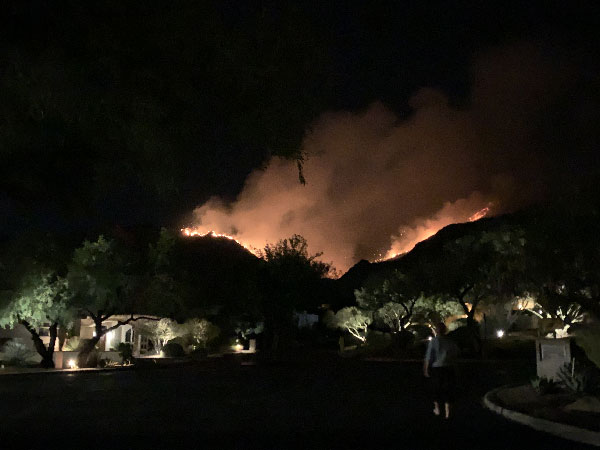Unfortunately, wildfires happen year after year. If you have wildfires in your region, the soot and smoke in the air can leave ash in your pool creating a perfect environment for chemical inefficiencies and stress on equipment. As a rule of thumb, if you can smell smoke or see a haze in the sky, it’s getting into your swimming pool too.

If ash gets in your pool, this debris either needs to be filtered or vacuumed out of the pool. There are no shortcuts to this, as physically cleaning the pool will be the best way to get large particles out of the water. Furthermore, fire debris can contain organic carbon, phosphorus, and nitrogen. These can potentially create a phosphate and a nitrate problem for your pools. Phosphates and nitrates can create massive chlorine demand. Ash will also tend to be more alkaline, which can cause the pH of the water to increase. This debris is great for gardening, but not for our pools.
As a result, wildfires near swimming pools lead to an abundance of algae’s favorite nutrients (eutrophication) in swimming pools. It’s best to address ash directly, rather than hoping chlorine can handle it–because it cannot.
- Use a net to remove as much physical debris as you can. Pollen, ash, and other small debris are likely to go through the net and not be captured, and that is to be expected. Just remove what you can.
- Clean out the skimmer baskets.
- Once physical debris is out of the pool, purge with CV-600 or CV-700 (32 fl.oz./10,000 gallons) and PR-10,000 (8-16 oz./10,000 gallons), if your pool has not already been purged and maintained with enzymes this season.
- If your pool has been maintained using enzymes already this season, your pool should be prepared to handle ash. Just increase the weekly maintenance dose as needed during wildfire season.
- Spray/broadcast CE-Clarifier (1 fl.oz./10,000 gallons) across the surface of the pool to accelerate particle filtration.
Filtering and vacuuming the pool will dramatically improve any chemical treatment you follow it up with. We strongly advise against any shortcuts to actually cleaning the pool. We also suggest cleaning the deck around the pool, perhaps with a garden hose to clear debris off the deck that may otherwise find its way into the pool after you leave.
Just because you’re not in the direct line of danger does not mean your pool is not being affected. In the case of an otherwise clean looking pool, we suggest testing water for phosphates and nitrates anyway. These things may go unseen but can impact your pool chemistry. We suggest you err to the side of caution and test your water for these micronutrients.
Good luck out there, and if the blaze is headed your way, don’t wait…be safe and evacuate.


